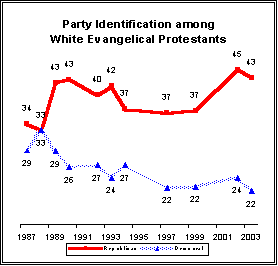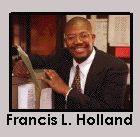Democratic Afrosphere Blog.
[I]n a new interview, Hillary Clinton reports that the evangelist fulfilled a pastoral role during the Monica Lewinsky scandal and helped the First Lady endure the ordeal. At that time, Clinton says, Graham was "incredibly supportive to me personally. And he was very strong in saying, 'I really understand what you're doing and I support you.' He was just very personally there for me."This all will infuriate many on the Left who are either atheists and agnostics and/or who have, at the very least, a deep Constitutionally-based aversion to encounters between church and state, as well as those who may be religious themselves but just hate and distrust conservative and right wing religious people. Many of us who feel this way will take Hillary's discussions of Billy Graham, and her acknowledgment of a long-standing friendship with him, to be just one more example of conservatism or perfidy on Hillary's part.
She added: "The entire world was judging my decisions and my actions and there weren't very many people who, frankly, were understanding, and he was. He said, 'You know, forgiveness is the hardest thing that we're called upon to do. And we all face it at some point in our lives and I'm just really proud of you for taking it on."
Hillary Clinton's relationship with Graham goes back nearly as far as the current President's. A lifelong Methodist, Clinton had seen Graham on television growing up in Chicago. But she did not hear him preach in person until 1971, when she attended the Northern California crusade at the invitation of her then boyfriend, Bill Clinton, who had first heard Graham preach in Little Rock in 1959. "I wanted her to see Billy," he said. Time
Of course, Hillary Clinton knows this, but Hillary Clinton does nothing by accident. She understands better than any other Democratic candidate (perhaps with the exception of Barack Obama) that the religious (and anti-religious) feelings of American voters are going to be pivotal in the 2008 election race. While no one constituency can make a president in isolation, the loss of one constituency - like religious voters - would doom the Democrats to failure.
In a study called "The 2004 Political Landscape: Evenly Divided and Increasingly Polarized," the Pew Research Center for people and the press highlights the increasing importance of religion in American elections:
America remains an intensely religious nation and, if anything, the trend since the late 1980s has been toward stronger religious belief. Eight-in-ten Americans (81%) say that prayer is an important part of their daily lives, and just as many believe there will be a Judgment Day when people will be called before God to answer for their sins. Even more people (87%) agree with the statement "I never doubt the existence of God."This has political consequences and compels any candidate who wants to seek AND WIN the presidency to conduct her campaign accordingly.
Clearly, views on these three statements are highly related, and when these three questions are combined into a single indicator of religious intensity, fully 71% agree with all three statements, while just 7% disagree with all three. Both of these figures are slightly higher than was the case 16 years ago, when 68% agreed with all three statements, and 5% disagreed with them all. With more people at each end of the spectrum, somewhat fewer Americans express mixed views about their religious beliefs today (22%) than was the case in the late 1980s (27%).
While attitudes toward prayer and faith have remained very stable over that period, the number expressing strong agreement has increased slightly over the past decade-and-a-half. Today, 51% completely agree that prayer is important in their lives, up from 41% in 1987. And the percentage who completely agree that they never doubt God's existence has risen from 60% to 69% over the same period. Pew Research Center
Religion, Ideology Increasingly ConnectedSo, independent researchers are telling us that religious voters' perceptions of the Democrats, combined with these voters' religious feelings, are a significant challenge for the Democratic Party. And yet, we know from past experience that election-eve conversions to church-going do not convince voters that Democrats "get" religion.
Over the past 15 years, religion and religious faith also have become more strongly aligned with partisan and ideological identification. Republicans and Democrats were equally likely to express strong personal religious attitudes in 1987 and 1988; the same percentage in both parties affirmed the importance of prayer, belief in Judgment Day and strong belief in God (71% in each). But over the past 15 years, Republicans have become increasingly united in these beliefs, opening up a seven-point gap between the parties (78% vs. 71% of Democrats).
This growing divide is even more evident in looking at the relationship between political ideology and religious faith. While there has always been a correlation between conservatism and religiosity, the relationship has grown notably stronger in the past 15 years.
Religious commitment has increased substantially among self-identified conservatives (81% agree with all three statements on faith and belief, compared with 73% in 1987-88). Liberals, on the other hand, have become somewhat less religiously oriented. Just over half of self-identified liberals (54%) agree with all three religious statements, down from 59% fifteen years ago.
This religious/political alignment can also be seen within religious denominations. In 1987 and 1988, white evangelical Protestants were split fairly evenly along partisan lines (34% Republicans, 31% Democrats). Today, there is a nearly two-to-one Republican advantage among white evangelicals (43%-22%). The partisanship of non-evangelical white Protestants and black Protestants, by comparison, has been relatively stable.
In addition, white Catholics, once strongly Democratic, are now much more politically divided. In the late 1980s, a significantly greater percentage of white Catholics identified themselves as Democrats than Republicans (41% vs. 24%). Today, partisan identification among white Catholics is divided almost evenly (31% Democrat, 29% Republican).
And again, this shift is driven predominantly by more highly religious Catholics. Among white Catholics who attend Mass regularly an 18-point Democratic identification advantage in the late 1980s (42% Democrat, 24% Republican) has turned into a dead-heat today (30% Democrat, 32% Republican). (See table on page 4.) Pew Research Center
So, rather than merely show up at a few churches in the weeks losing up to a (losing) presidential contest in 2008, Hillary Clinton is proactively publicizing a convincing and factual narrative about her religious life that posits her as a long-time believing in relying on the power of God and religious leaders in moments of personal crisis, just like the religious voters choices may decide the 2008 presidential election in Hillary Clinton's favor.
Meanwhile, those who fear this portends conservative Clinton social policies need only remember that it was the Clintons who proposed allowing gays to serve openly in the military in 1993, and they were criticized for seeming to make the fulfillment this campaign promise their first order of business after taking the White House.
The only two Democratic presidents of the last thirty years were Bill Clinton (constantly seen deeply appreciating church services in the decades before he was elected) and Jimmy Carter, a born-again Christian. With the country becoming more religious and not less, it is unlikely that a Democrat perceived as anti-religious or a-religious can win the presidency in 2008.
And so Democrats who are appalled when our candidates speak about religion on the campaign trail are Democrats who will either have to hold their noses and accept the religious patter, or vote against the religious patter in the primaries and then watch on television as the Mormon is given the oath of office in January of 2009.






No comments:
Post a Comment